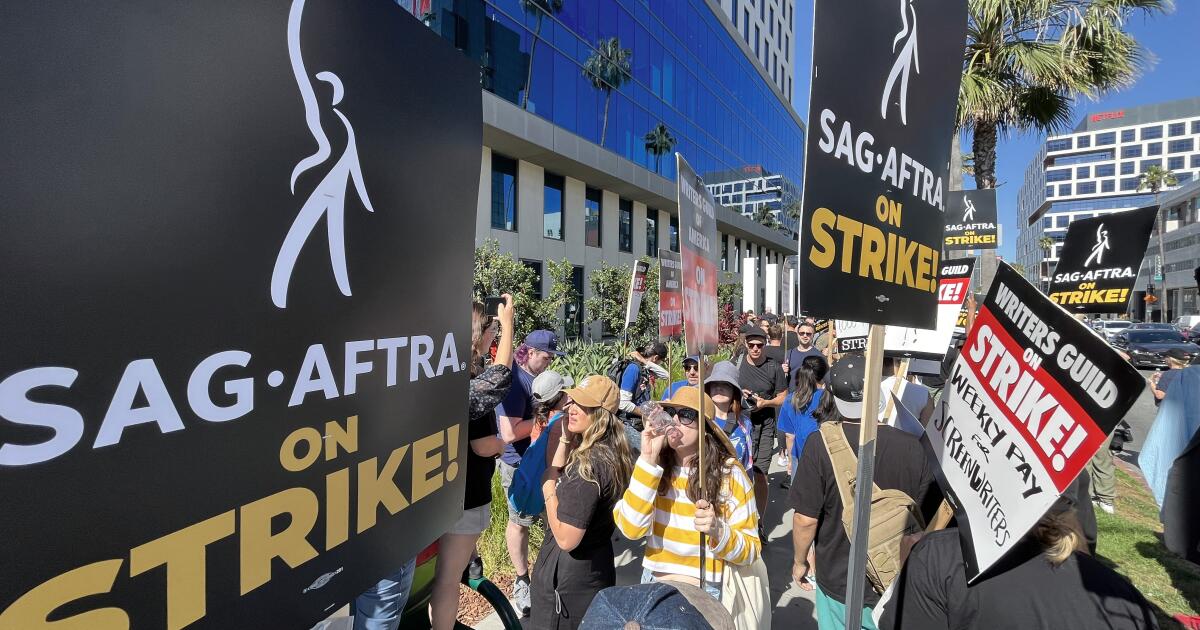Negotiations between actors union SAG-AFTRA and the Hollywood studios hit a snag Wednesday over issues including the union’s demand that cast members receive a share of the revenue generated by streaming shows, according to sources close to the talks who were not authorized to comment.
Wednesday’s breakdown came amid rising tensions over a lack of compromises more than a week after the sides resumed talks in hopes of ending a months-long actors’ strike that has crippled Hollywood’s production economy and publicity machine.
Company executives have rebuffed the union’s demands to share streaming revenue, which would be in addition to existing residuals, at a time when legacy entertainment companies are still losing money on direct-to-consumer services as they try to transition away from the traditional pay-TV business.
SAG-AFTRA has long said it wants a 2% cut of streaming revenue. The company executives believe that’s not a realistic ask. The two sides are also struggling over how to reach a common ground on the use of generative artificial intelligence, which actors say represents a threat to their livelihoods.
Talks, whichresumed on Oct. 2, have gone slowly. Company executives — including Walt Disney Co. Chief Executive Bob Iger, Netflix Co-CEO Ted Sarandos, Warner Bros. Discovery CEO David Zaslav and NBCUniversal Studio Group Chairman Donna Langley have been attending the every-other-day sessions.
SAG-AFTRA President Fran Drescher has also been at the forefront of the talks.
SAG-AFTRA and the Alliance of Motion Picture and Television Producers, which represents major studios in negotiations with Hollywood labor groups, did not have a comment.
Langley declined to discuss the negotiations during a scheduled appearance Wednesday night at a Bloomberg News media conference.
“We’ve been spending time with the actors and we want to spend as much time as it takes until we reach a resolution and get the industry back on its feet and back to work,” Langley said. “That’s been our goal since Day 1.”
Film and TV actors have been on strike since mid-July. The actors guild is seeking greater compensation and higher residuals, in addition to revenue sharing and greater protections against the use of artificial intelligence to replicate a performer’s image and voice.
SAG-AFTRA had proposed using a content valuation tool from third-party data research firm Parrot Analytics to determine the amount of revenue generated by streaming programs and then studios would pay 2% of the revenue contribution for the program to actors.
But the AMPTP raised concerns about the proposal, voicing doubts about whether Parrot’s data showed a “demonstrable link to the actual revenue received by the service in the form of new or retained subscribers.”
Parrot bases its calculations on consumption through peer-to-peer services, social video, social media chatter and other metrics. A Parrot executive told the Times that the company believes its technology which captures that behavior is a good indicator of financial performance.
The AMPTP has argued that the actors’ proposal in particular is seeking rewards in the event of success without any additional risk from the performers, whereas the studios are taking big financial swings on high-budget productions that may not make any money.
SAG-AFTRA chief negotiator Duncan Crabtree-Ireland told the Times earlier this year that he disagreed. “Actors put a lot more risk into these projects than the executives who sit back and collect huge bonuses when these projects are successful,” he said.
The roadblock comes after some people in the industry had hoped that SAG-AFTRA and AMPTP would reach a tentative agreement following the WGA members approving a new contract after striking for 148 days. The writers’ strike ended late last month, shortly after the guild and the studios reached an agreement that included higher pay, AI protections and viewership-based bonus payments for streaming shows.
Ari Emanuel, CEO of Endeavor, expressed frustration at the slow pace of talks.
“It’s affecting a lot of people and a lot of people are hurting,” Emanuel said at the Bloomberg Screentime conference. “You’re not winning an Oscar for this negotiation.”
“You don’t have to solve every issue right now. You can do it best you can in the moment,” Emanuel said.




